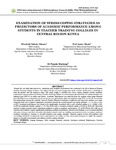| dc.description.abstract | Despite the very high stake placed on education, poor academic performance has continued to be felt in Kenya in Primary
Teacher Training colleges in Kenya. This affects the life and career progression of the students and becomes a challenge to
both the parents and the nation at large. The study sought to establish how stress coping strategies predict academic
performance among students in Primary Teacher Training Colleges in central region. Questionnaire on coping strategies was
adapted from CISS-21 by endler and Parker. Academic Performance was inferred from the students mean grade obtained
from the Mid-course examinations at the end of year one. Quantitative data was analyzed using SPSS version 26. To examine
the relationships among the variables Pearson Product Moment Correlation Coefficient and regression analysis were used.
Generally there was a negative significant correlation between the overall measure of Coping strategies ( r = 0.-56, p <0.01,
n=197) .Academic performance was found to be significantly correlated with a) task oriented coping at (r = 0.68,p <0.01,
n=197),b) emotional oriented coping( r = 0.-75,p,<0.01) and c) avoidance oriented coping (r=0.-68 ,p,<0.01).On regression
analysis, Coping strategies had a significant predictive weight on academic performance (F,1,195)=89.5,p<0.0) with use of
emotion and avoidance coping significantly predicting academic performance. Based on the findings it was recommended that
educators, lecturers and other education stakeholders should create an enabling environment in order to enhance students’
academic self-efficacy, response to stressful situations and coping strategies. Students support services like guidance and
counselling should be strengthened, and is important for the colleges to have intervention programs to buffer the negative
impact of stressful environments and enhance positive coping strategies. | en_US |

